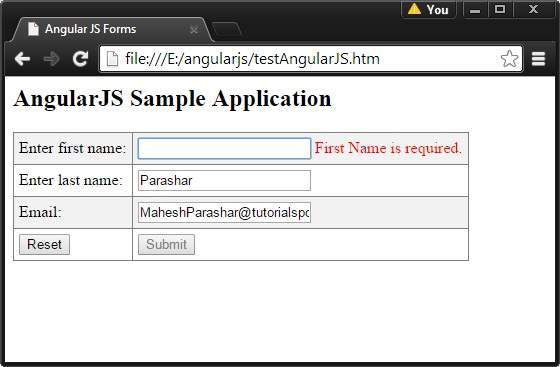AngularJS enriches form filling and validation. We can use ng-click event to handle the click button and use $dirty and $invalid flags to do the validation in a seamless way. Use novalidate with a form declaration to disable any browser-specific validation. The form controls make heavy use of AngularJS events. Let us have a look at the events first.
Events
AngularJS provides multiple events associated with the HTML controls. For example, ng-click directive is generally associated with a button. AngularJS supports the following events:
- ng-click
- ng-dbl-click
- ng-mousedown
- ng-mouseup
- ng-mouseenter
- ng-mouseleave
- ng-mousemove
- ng-mouseover
- ng-keydown
- ng-keyup
- ng-keypress
- ng-change
ng-click
Reset data of a form using on-click directive of a button.
<input name="firstname" type="text" ng-model="firstName" required>
<input name="lastname" type="text" ng-model="lastName" required>
<input name="email" type="email" ng-model="email" required>
<button ng-click="reset()">Reset</button>
<script>
function studentController($scope) {
$scope.reset = function(){
$scope.firstName = "Mahesh";
$scope.lastName = "Parashar";
$scope.email = "MaheshParashar@tutorialspoint.com";
}
$scope.reset();
}
</script>
Validate Data
The following can be used to track error.
- $dirty - states that value has been changed.
- $invalid- states that value entered is invalid.
- $error- states the exact error.
Example
The following example will showcase all the above-mentioned directives.
testAngularJS.htm
<html>
<head>
<title>Angular JS Forms</title>
<style>
table, th , td {
border: 1px solid grey;
border-collapse: collapse;
padding: 5px;
}
table tr:nth-child(odd) {
background-color: #f2f2f2;
}
table tr:nth-child(even) {
background-color: #ffffff;
}
</style>
</head>
<body>
<h2>AngularJS Sample Application</h2>
<div ng-app="" ng-controller="studentController">
<form name="studentForm" novalidate>
<table border="0">
<tr><td>Enter first name:</td><td><input name="firstname" type="text" ng-model="firstName" required>
<span style="color:red" ng-show="studentForm.firstname.$dirty && studentForm.firstname.$invalid">
<span ng-show="studentForm.firstname.$error.required">First Name is required.</span>
</span>
</td></tr>
<tr><td>Enter last name: </td><td><input name="lastname" type="text" ng-model="lastName" required>
<span style="color:red" ng-show="studentForm.lastname.$dirty && studentForm.lastname.$invalid">
<span ng-show="studentForm.lastname.$error.required">Last Name is required.</span>
</span>
</td></tr>
<tr><td>Email: </td><td><input name="email" type="email" ng-model="email" length="100" required>
<span style="color:red" ng-show="studentForm.email.$dirty && studentForm.email.$invalid">
<span ng-show="studentForm.email.$error.required">Email is required.</span>
<span ng-show="studentForm.email.$error.email">Invalid email address.</span>
</span>
</td></tr>
<tr><td><button ng-click="reset()">Reset</button></td><td><button
ng-disabled="studentForm.firstname.$dirty && studentForm.firstname.$invalid ||
studentForm.lastname.$dirty && studentForm.lastname.$invalid ||
studentForm.email.$dirty && studentForm.email.$invalid"
ng-click="submit()">Submit</button></td></tr>
</table>
</form>
</div>
<script>
function studentController($scope) {
$scope.reset = function(){
$scope.firstName = "Mahesh";
$scope.lastName = "Parashar";
$scope.email = "MaheshParashar@tutorialspoint.com";
}
$scope.reset();
}
</script>
<script src="http://ajax.googleapis.com/ajax/libs/angularjs/1.2.15/angular.min.js"></script>
</body>
</html>
Output
Open the file testAngularJS.htm in a web browser and see the result.



No comments:
Post a Comment